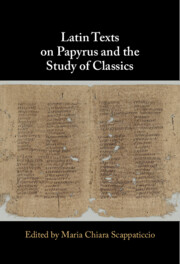3364760 results
A Social and Economic History of the Theatre to 300 BC
- Coming soon
-
- Expected online publication date:
- December 2025
- Print publication:
- 31 December 2025
-
- Book
- Export citation

Latin Texts on Papyrus and the Study of Classics
- Coming soon
-
- Expected online publication date:
- December 2025
- Print publication:
- 31 December 2025
-
- Book
- Export citation
The State of Nature and the Shaping of Modernity
- Tracing the Roots of Colonialism, Secularity, and Ecology
- Coming soon
-
- Expected online publication date:
- December 2025
- Print publication:
- 31 December 2025
-
- Book
- Export citation
The Cambridge History of Australian Poetry
- Coming soon
-
- Expected online publication date:
- December 2025
- Print publication:
- 31 December 2025
-
- Book
- Export citation
A Narratological Commentary on Herodotus' Histories
- Coming soon
-
- Expected online publication date:
- December 2025
- Print publication:
- 31 December 2025
-
- Book
- Export citation
Disclosureland
- How Corporate Words Constrain Racial Progress
- Coming soon
-
- Expected online publication date:
- November 2025
- Print publication:
- 30 November 2025
-
- Book
- Export citation
Literature and Art as Cognitive Objects
- From a Poetics of Language to a Poetics of Action
- Coming soon
-
- Expected online publication date:
- November 2025
- Print publication:
- 30 November 2025
-
- Book
- Export citation
Seminars in Child and Adolescent Psychiatry
- Coming soon
-
- Expected online publication date:
- November 2025
- Print publication:
- 30 November 2025
-
- Book
- Export citation
The Italian Renaissance
- A Cultural History
- Coming soon
-
- Expected online publication date:
- November 2025
- Print publication:
- 30 November 2025
-
- Book
- Export citation
The Law and Practice of International Administrative Tribunals
- Coming soon
-
- Expected online publication date:
- November 2025
- Print publication:
- 30 November 2025
-
- Book
- Export citation
The China Question
- Eight Centuries of Fantasy and Fear
- Coming soon
-
- Expected online publication date:
- November 2025
- Print publication:
- 30 November 2025
-
- Book
- Export citation
Marketing Channel Management
- Organization and Coordination
- Coming soon
-
- Expected online publication date:
- November 2025
- Print publication:
- 30 November 2025
-
- Book
- Export citation
Armed Citizens and Citizens in Arms
- The Military and the Creation of the State of Peru, 1800‒1860
- Coming soon
-
- Expected online publication date:
- November 2025
- Print publication:
- 30 November 2025
-
- Book
- Export citation
Catatonia
- A Practical Guide to a Clinical and Scientific Conundrum
- Coming soon
-
- Expected online publication date:
- November 2025
- Print publication:
- 30 November 2025
-
- Book
- Export citation
Full Quantum Effects in Condensed Matter Physics
- Beyond the Born-Oppenheimer Approximation
- Coming soon
-
- Expected online publication date:
- November 2025
- Print publication:
- 30 November 2025
-
- Book
- Export citation
The Cambridge Companion to the Nazi-Soviet War
- Coming soon
-
- Expected online publication date:
- November 2025
- Print publication:
- 30 November 2025
-
- Book
- Export citation
Strikingly Similar
- Plagiarism and Appropriation from Chaucer to Chatbots
- Coming soon
-
- Expected online publication date:
- November 2025
- Print publication:
- 30 November 2025
-
- Book
- Export citation
Magnetoelectric Dipole Antennas
- Coming soon
-
- Expected online publication date:
- November 2025
- Print publication:
- 30 November 2025
-
- Book
- Export citation
The New Immigration Challenge
- A Psychological Exploration Toward Solutions
- Coming soon
-
- Expected online publication date:
- November 2025
- Print publication:
- 30 November 2025
-
- Book
- Export citation
The Cambridge History of Rights
- Coming soon
-
- Expected online publication date:
- November 2025
- Print publication:
- 30 November 2025
-
- Book
- Export citation


